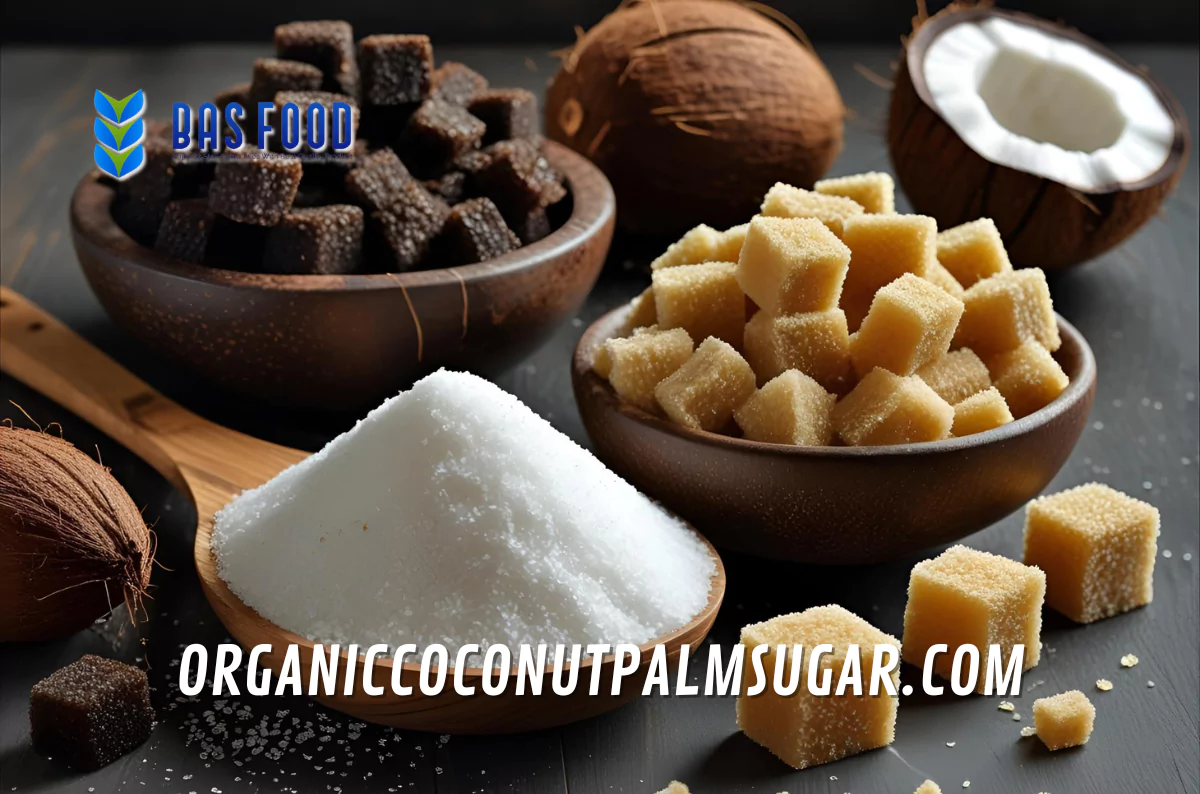When it comes to sweetening food and drinks, the choice often comes down to two broad categories—natural and refined. In recent years, the conversation around coconut cube sugar vs regular sugar has gained attention. People are not only looking for a tasty sweetener but also for one that offers health benefits.
Regular sugar, the kind most of us have in our kitchens, is processed from sugarcane or sugar beets. On the other hand, coconut cube sugar is a natural cube sweetener made from the sap of coconut blossoms, shaped into convenient cubes. While both add sweetness, their nutritional profiles, processing methods, and health effects differ significantly.

How Each Sugar Is Made
Regular Sugar Production
Regular table sugar—scientifically known as sucrose—comes from sugarcane or sugar beets. The process involves crushing the plant material, extracting the juice, filtering, boiling, and then refining it until pure white crystals form. While effective, this process strips away minerals and nutrients, leaving a product that is essentially pure carbohydrate.
Refined sugar has a long shelf life, is inexpensive, and easily dissolves, making it popular worldwide. However, it offers no vitamins or minerals, earning it the nickname “empty calories.”
Coconut Cube Sugar Production
Coconut cube sugar begins its journey in coconut plantations, where farmers collect sap from the flower buds of coconut palms. The sap is heated gently until it thickens into a syrup, then poured into molds to form neat cubes. This minimal processing keeps more of the sap’s natural nutrients intact.
Since it’s made without chemical bleaching or preservatives, coconut cube sugar retains a light caramel flavor and a golden-brown color. It’s considered a refined sugar replacement for people looking to cut down on highly processed sweeteners.
Nutritional Differences
Macronutrients and Calories
From a calorie standpoint, both types are similar—roughly 15–16 calories per teaspoon. However, coconut cube sugar contains small amounts of minerals like potassium, magnesium, and iron, thanks to its minimal processing. Regular sugar, by contrast, is stripped of these nutrients during refining.
Glycemic Index (GI)
One of the main points in the coconut cube sugar vs regular sugar debate is the glycemic index. Regular sugar has a GI of around 65, which can spike blood glucose levels quickly. Coconut cube sugar has a lower GI, typically between 35–54, meaning it raises blood sugar more gradually.
This slower release of energy can be beneficial for people monitoring blood sugar levels, though moderation is still key.
Health Impacts
Regular Sugar and Health Risks
Consuming too much refined sugar has been linked to obesity, type 2 diabetes, heart disease, and dental issues. The problem isn’t that sugar is inherently “toxic,” but that modern diets often include excessive amounts from processed foods and drinks.
When sugar is consumed in high quantities, it provides quick energy but no nutrients, leading to a cycle of energy crashes and cravings.
Coconut Cube Sugar as a Healthier Choice
While coconut cube sugar still contains sucrose, its trace nutrients and lower GI make it one of the better healthy sugar alternatives. It’s not a “superfood,” but it’s a more natural option for those seeking a refined sugar replacement.
It’s also appealing for people trying to avoid overly processed sweeteners without sacrificing flavor. Still, like all sugars, it should be used in moderation to avoid excessive calorie intake.
Taste and Culinary Uses
Flavor Profile
Regular sugar is neutral in taste, which makes it versatile for both sweet and savory recipes. Coconut cube sugar has a mild caramel-like flavor with a hint of toffee, which adds depth to baked goods, coffee, tea, and desserts.
This unique flavor can enhance recipes like banana bread, oatmeal, and even savory dishes such as stir-fries or marinades.
Convenience and Storage
Coconut cube sugar’s cube form makes portion control easy—especially for beverages. Regular sugar is more common and readily available in most supermarkets, but coconut cube sugar is gaining popularity in health food stores and online markets.
Both store well in airtight containers, though coconut sugar may clump slightly in humid environments.
Environmental Impact
Coconut palms are a sustainable crop, producing sap year-round without harming the tree. This makes coconut cube sugar an eco-friendly choice. The production process is low-impact and often involves small-scale farmers in tropical regions, especially in Indonesia and the Philippines.
Regular sugar production, particularly from sugarcane, can be resource-intensive, requiring large amounts of water and sometimes leading to soil degradation if not managed sustainably.
Choosing natural cube sweeteners like coconut sugar can support smallholder farmers and promote more sustainable agriculture.
Cost and Availability
Regular sugar remains cheaper due to mass production and established supply chains. Coconut cube sugar tends to be more expensive because of its labor-intensive harvesting and smaller-scale production.
However, as demand for healthy sugar alternatives grows, prices are becoming more competitive, and availability is expanding worldwide.
Which Should You Choose?
If you value affordability, neutral taste, and easy availability, regular sugar might still be your go-to. But if you want a more natural sweetener with a lower GI and trace minerals, coconut cube sugar is worth considering.
For people transitioning toward a healthier diet, replacing part of your refined sugar intake with natural cube sweeteners can be a step in the right direction.
About CV Bonafide Anugerah Sentosa
CV Bonafide Anugerah Sentosa is a trusted Indonesian exporter specializing in coconut products, spices, and fishery commodities. The company supplies high-quality coconut cube sugar sourced directly from farmers, ensuring freshness and ethical sourcing. They also serve as a reliable spices supplier for global importers.
With a commitment to quality and sustainability, CV Bonafide Anugerah Sentosa connects buyers from Europe, the USA, Taiwan, and beyond with the best of Indonesia’s agricultural and marine products.
Conclusion
The coconut cube sugar vs regular sugar debate isn’t about declaring a universal winner—it’s about finding what fits your health goals, taste preferences, and values. While regular sugar is familiar and widely available, coconut cube sugar offers a flavorful, minimally processed option that can fit into a balanced lifestyle.
Whether you choose one or both, the key is moderation. In the end, a sweet life is best enjoyed without overindulgence.
Contact CV Bonafide Anugerah Sentosa how we can provide the best solutions for you. WhatsApp: +62 8213 4505 737, Email: info@bonafideanugerahsentosa.com / bas.mdir@gmail.com.

